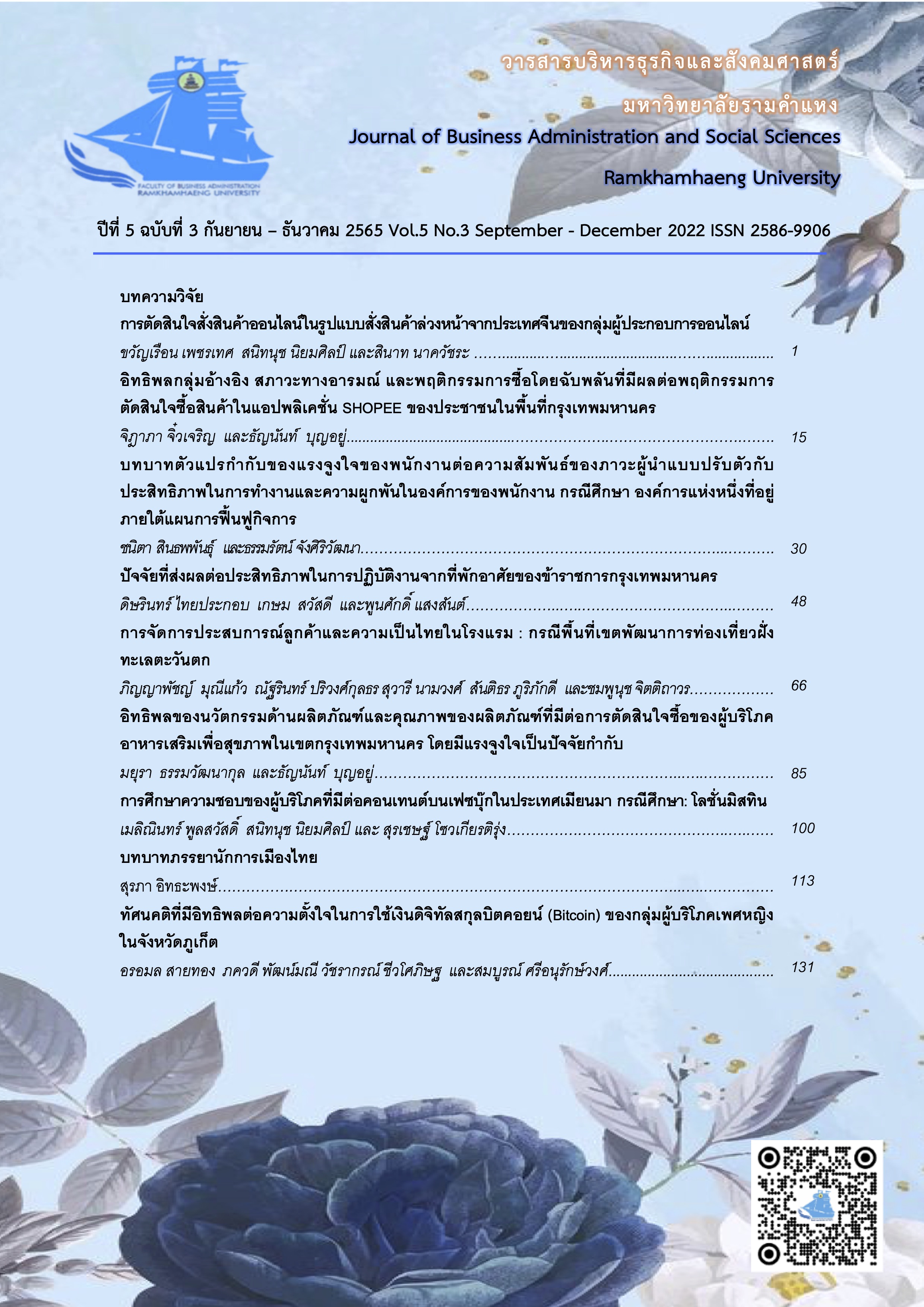The Moderating Role of Employee Motivation on the Relationship of Adaptive Leadership on Work Efficiency and Organizational Commitment: A Case Study of an Organization Under a Rehabilitation Plan
Main Article Content
Abstract
In this quantitative research investigation, the researchers test the moderating role of work motivation on the relationship between adaptive leadership and work efficiency and organizational commitment of employees in an organization under a rehabilitation plan. Data were collected using the method of stratified sampling from 372 subjects. Data were analyzed using the technique of partial least square (PLS) with PLS-SEM 3.0 program to test research hypotheses.
Findings showed that adaptive leadership negatively related to work efficiency of the employees under study (ꞵ = -0.24; p < 0.05) and positively related to organizational commitment (ꞵ = 0.20; p < 0.05). Employees’ work motivation did not affect the relationship between adaptive leadership and work efficiency and organizational commitment. Recommendations from this study are important to the organizations under a rehabilitation plan facing changing situations. Therefore, the leadership that negatively affects work efficiency in the organizations under a rehabilitation plan must take into consideration and pay attention. The organizations under a rehabilitation plan should develop leadership of the organizations in all sectors to be ready to be role models and leaders for the employees. This will ensure work efficiency and foster the employees to have organizational commitment which will enhance good relationship to fight against all kinds of obstacles.
Article Details

This work is licensed under a Creative Commons Attribution-NonCommercial-NoDerivatives 4.0 International License.
เนื้อหาและข้อมูลในบทความที่ลงตีพิมพ์ในวารสารบริหารธุรกิจและสังคมศาสตร์ มหาวิทยาลัยรามคำแหง ถือเป็นข้อคิดเห็นและความรับผิดชอบของผู้เขียนบทความโดยตรง ซึ่งกองบรรณาธิการไม่จำเป็นต้องเห็นด้วย หรือร่วมรับผิดชอบใดๆ
บทความ ข้อมูล เนื้อหา รูปภาพ ฯลฯ ที่ได้รับการตีพิมพ์ในวารสารบริหารธุรกิจและสังคมศาสตร์ มหาวิทยาลัยรามคำแหง ถือเป็นลิขสิทธิ์ของวารสารบริหารธุรกิจและสังคมศาสตร์ มหาวิทยาลัยรามคำแหง หากบุคคลหรือหน่วยงานใดต้องการนำบทความทั้งหมดหรือส่วนหนึ่งส่วนใดไปเผยแพร่ต่อ หรือเพื่อกระทำการใดๆ จะต้องได้รับอนุญาตเป็นลายลักษณ์อักษรจากวารสารบริหารธุรกิจและสังคมศาสตร์ มหาวิทยาลัยรามคำแหง ก่อนเท่านั้น
References
กระทรวงยุติธรรม. (2563). การแก้ไขปัญหาทางธุรกิจของลูกหนี้โดยการฟื้นฟูกิจการ. สืบค้นจาก https://www.led.go.th/brd/file/
สุวัฒน์ จุลสุวรรณ. (2564).ความสัมพันธ์ระหว่างภาวะผู้นำการปรับเปลี่ยนกับประสิทธิผลการบริหารสถานศึกษา สังกัดคณะกรรมการการศึกษาขั้นพื้นฐาน. วารสารวิชาการมหาวิทยาลัยการจัดการและเทคโนโลยีอีสเทิร์น 17(2), 28-40.
Allozi, A. I., Alshurideh, M., Alhamad, A. Q., & Al Kurdi, B. H. (2022). Impact of transformational leadership on the job satisfaction with the moderating role of organizational commitment: Case of UAE and Jordan manufacturing. Academy of Strategic Management Journal, 21(s-2), 1-13. ISSN: 1939-6104-21. S2-001.
Caringal-Go, J. F., Teng-Calleja, M., Franco, E. P., Manaois, J. O., & Zantua R. M. S. (2021). Crisis leadership from the perspective of employees during COVID-19 pandemic. Leadership & Organization Development Journal, 42(4), 630-643. Doi: 10.1108/LODJ-07-2020-0284
Dysvik, A., and Kuvaas, B. (2011). Intrinsic motivation as a moderator on the relationship between perceived job autonomy and work performance. European Journal of Work and Organizational Psychology, 20(3), 367-387. Doi: 10.1080/13594321003590630
Erkutu, H. (2007). The impact of transformational leadership on organizational and leadership effectiveness. Journal of Management Development, 27(7), 708-726. Doi: 10.1108/02621710810883616
Garavaglia, C., Sancino, A., & Trivellato, B. (2020). Italian mayors and the management of COVID-19: Adaptive leadership for organizing local governance. Eurasian Geography and Economic, 62(1), 76-92. Doi: 10.1080/15387216.2020.1845222
Hair J. F., Black, W. C., Babin, B. J., & Anderson, R. E. (2019). Multivariate data analysis (8th ed.). Hamshire, UK: Cengage.
Heifetz, R. A., & Laurie, D. L. (1997). The work of leadership. Harvard business review, 75, 124-134.
Herzberg, F., Mausner, B., & Snyderman, B. B., (1959). The motivation to work. New Yourk: John Wiley & Sons. In Work and the nature of man, F. Herzberg (1973), New York: Menter Book, pp. 91-111.
Jangsiriwattana, T. (2019). The relationship between transformational and transactional leadership: Employee perception of organizational performance and work engagement. Journal of International Academy for Case Studies, 25(3), 1-10. ISSN: 1532-5822-25-3.148
Johansen, B. P. (1990). Situational leadership: A review of the research. Human Resource Development Quarterly, 1(10), 73-85. Doi: 10.1002/hrdq.3920010109
Khalizadeh, J. & Tasci, A.D.A. (2010). Large sample size, significance level, and the effect size: Solutions to perils of using big data for academic research. Tourism Management, 62; 89-96.
Kimberly, J. R. (1975). Environmental constrains and organizational structure: A comparative analysis of rehabilitation organizations. Administrative Science Quarterly, 20(1), 1-9. Retrieved from https://www.jstor.org/stable/2392119
Krejcie, R. V., & Morgan, D. W. (1970). Determining sample size for research activities. Educational and psychological measurement, 30(3), 607-610.
Nebiyu, K. S., & Kassahun, T. (2021). The effects of adaptive leadership on organizational effectiveness at public higher education institutions of Ethiopia. International Journal of Organizational Leadership, 10(s-2021), 141-159. Retrieved from https://www.ijol.cikd.ea
Northouse, P. G. (2016). Leadership: Theory and Practice (7th ed.). London, UK: Sage
Rabiul, M. K., Patwary, A. K., & Panha, I. (2022). The role of servant leadership, self-efficacy, high performance work system, and work engagement in increasing service-oriented behavior. Journal of Hospitality Marketing & Management, 31(4), 504-526. Doi: 10.1080/19368623.2022.1990169
Randall, L. M., & Coakley, L. A. (2006). Applying adaptive leadership to successful change initiatives in academia. Leadership & Organization Development Journal, 28(4), 325-335. Doi: 10.1108/01437730710752201
Santra, S., & Alat , P. (2021). Adaptive leadership of doctors during COVID-19. Leadership in Health Service, 35(2), 246-266. Doi: 101108/LHS-08-2021-0073
Shiva, M. S. A. M., & Suar, D. (2012). Transformational leadership, organizational culture, organizational effectiveness, and program outcomes in non-governmental organizations. International Journal of Voluntary and Nonprofit Organization, 23, 684-710. Doi: 10.1007/s11266-011-9230-4.
Suputra, F. (2021). Leasdership, communication, and work motivation in determining the success of professional organizations. Journal of Law, Politic and Humanities, 1(2), 59 – 70. ISSN: 2747-1985
Trepanier, S. G., Vallerand, R., Menard, J., & Peterson, C. (2020). Job resource and burnout: Work motivation as a moderator. Stress & Health, 36(4), 433-441. Doi: 10.1002/smi.2939
Yukl, G., & Mahsud, R. (2010). Why flexible and adaptive leadership essential. Consulting Psychology Journal: Practice and Research, 62(2), 81-93. Doi: 10.1037/a0019835


